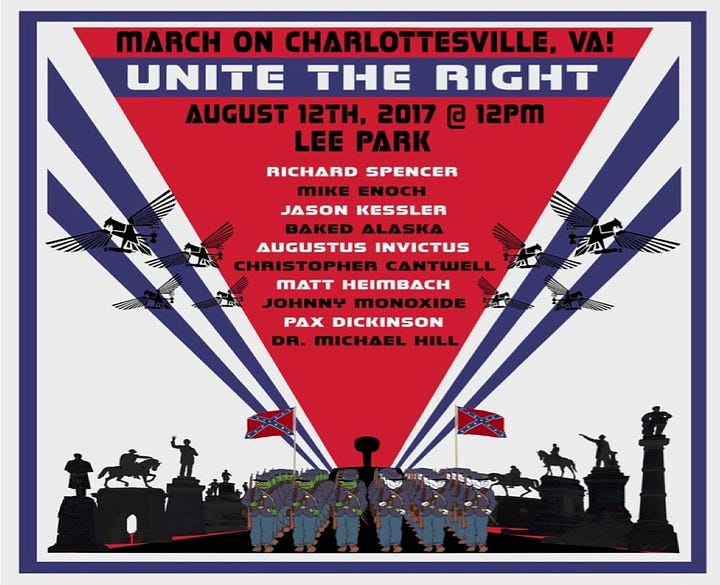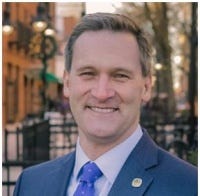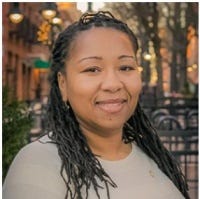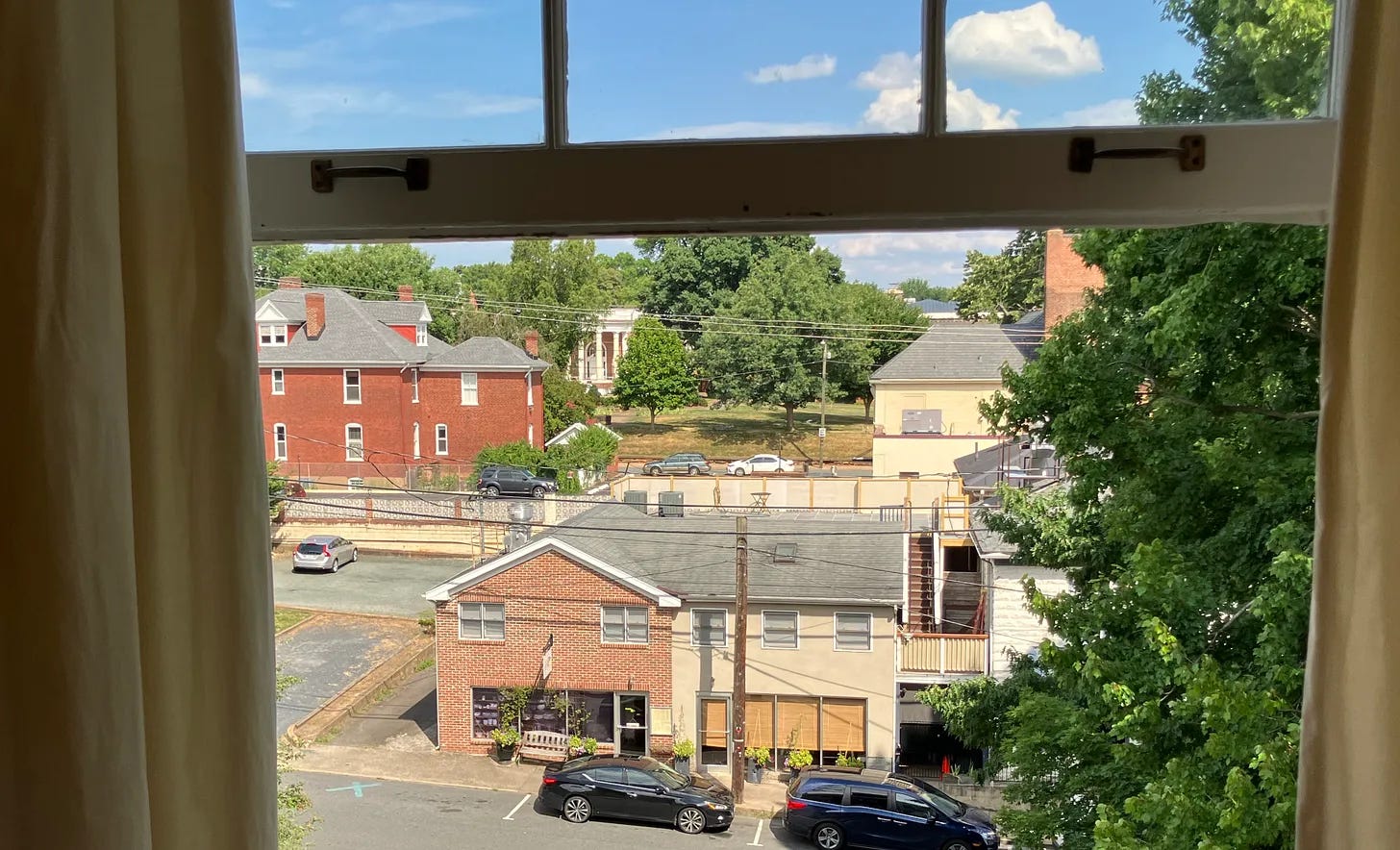Police Stories 5: The Aftermath
Part 14 of Welcome to Charlottesville, a weekly visit to a town, a failed art project, and the future of America.
The Summer of Hate
I was feeling guilty about the failure of my Police Stories project. My friend Armando Diaz and I were having a drink in New York at some second-floor restaurant overlooking Herald Square. Armando runs the Magnet Theater where I learned improv, and learned to teach improv, and learned the basic model for the theater company I run now. So I trust his judgment. I told him about the project to interview police and then create a play, and how in May before the interviews were finished or the money raised, the Alt-Right started coming to Charlottesville, culminating in Unite the Right in August 2017.
At UTR the police had had some sort of stand-down order, formal or informal, and let all sort of violence happen, and the town was furious. So a police play would be unwatchable. Who could think about police without wondering where they were and what they did in July when the KKK came and August when the Alt-Right came, and how they felt about it all? I would have to follow up all the interviews and what to do about those who didn’t want to do follow ups? At a time when victims of UTR were doing GoFundMe campaigns for medical bills no one would give money for a show about cops.
But didn’t I owe something to Melissa Wender who had conducted and transcribed the original interviews? Didn’t I owe even more to all those officers who had agreed to participate, sharing truths about their lives on the assumption they would be part of some kind of play?
What do I do?
Armando reminded me that as far as the fundraising goes the story had to be about me now. It couldn’t be the police because we only had a beginning and middle to their story—but no end. And they were hated. It had to be about my passions and my interests.
And what were those?


A City in Shock
The Alt-Right did have a beginning, middle, and end. Charlottesville was the end. They had used the photo-op of Charlottesville to merge White Power weekend warrior boot-stomping with online febrile intensity until it blew up in their faces. The publicty they craved gave them away. And their response to events in Charlottesville dug their public-relations grave. Over the months after UTR their websites were shut down, funding mechanisms cancelled, and members doxed on social media. Their former mainstream conservative supporters ran for cover. The Alt-Right as an attempt to mainstream fascism would never recover. Trump’s failure to distance himself turned a lot of swing voters against him, putting the last nail in any hope that he could be a unifying politician.1 Allegedly inspired by the UTR reports on TV, Joe Biden decided to run for president. Biden won, leaving Trump the revenge-seeking man he is today.
But none of this meant much to Charlottesville in the fall of 2017. Many were not sure the Alt-Right was even weakened. What if they came back to exact revenge? But more than that, local citizens were too furious with their own government to take satisfaction in their historical take-down of nascent fascism.
A democratically-elected government representing the people of the city had let violent fascists invade and terrorize them. No one could pin down what the government had done wrong specifically, other than not arrest people on August 12th, but everyone could feel there was more wrong than that in their bones. What’s the point of a professional government with its divisions and agencies, rules and procedures, budgets and policies, and endless meetings, if it can’t stop your town from being mauled by invading fascists? Isn’t safety pretty basic to functional political systems?
At the first City Council meeting after UTR mayor Mike Signer tried to keep to the agenda by reading his prepared statement, but the crowd shouted him down and attendees unfurled a banner reading “Blood On Your Hands.” The council members fled and some attendees were arrested. Eventually, the council came back and Wes Bellamy chaired the meeting. The whole session was turned over to letting attendees speak. For the rest of that meeting and the rest of the fall city council sessions were chaotic, with activists and aggrieved citizens interrupting and sometimes being thrown out. Council members, much like the police back in July, felt that they were victims just as much as the public, and shouldn’t they be appreciated for the burden of leadership in such a trying time?
The public probably settled their ire mostly on Signer as mayor, and other council members were upset with him too, not for doing too little but for for asserting more power than the ceremonial office of mayor warranted. Meanwhile there were questions about Police Chief Al Thomas and City Manager Maurice Jones and how they handled UTR. Council asked a law firm to independently review what happened.
Meanwhile in the November city election independent candidate Nikuyah Walker, an activist whose campaign slogan was “Unmask the Illusion,” won on a strong turnout with a record number of votes. She had been a critic of the city, and the city’s culture of white, upscale non-profits, and Signer. Signer seems to have returned the favor by leaking criticisms of Walker to the Daily Progress. She won anyway and refused to speak to the Daily Progress ever after.


The requested investigation of UTC, called the Heaphy Report, came out a couple weeks before Walker and the other new electee Heather Hill took office. The Heaphy Report was clear, direct, and informative. They uncovered much of what many suspected about the preparations for UTR, which I discussed a few weeks ago.
Signer turned the mayor’s gavel over to Walker, Thomas and Jones resigned, and for several years city jobs seemed to turn over faster than a rolodex. I was a vice president of McGuffey Art Center during that period and we were trying to renew our lease with the city, and our contact person changed three times due to resignations. Our lease even lapsed for more than a year because there was literally no one in city hall to type up a new one. (We paid in the meantime and eventually got it straightened out.)
Critics of Walker would blame all this on her, and she did not seem gifted at the give-and-take of city government (Activists often are poor at governing since they are so values-driven.) and despite a vote total that many would take as a citywide mandate, Walker saw her job as representing her supporters. But beyond that—like all of us—I think she knew the system was wrong but couldn’t figure out what else to do.2 She wanted more diversity and representation, but city council was 2/5 black, and the two most powerful city offices (Police Chief and City Manager) were held by African-Americans. Yet this didn’t seem to alter the city’s culture of white, upscale non-profits, nor improve the quality of life for everyone else.
One thing I always liked about Walker (and I voted for her in 2017) is that I think she wanted to live here and see her children and her children's children live here. Maybe she moves away. Maybe I will. But if a politician wants to stay in a place that means they have a vested interest in figuring out how to make it better. Walker’s term on Council didn’t accomplish much, but life is long, and Walker may have a lot more to give.
The Consensus
The Heaphy Report presented astute tactical criticisms. It’s the most readable government report I’ve ever come across. But the conclusion was the boilerplate conventional thinking that UTR should have discredited. Their statement could have been written by me, Mike Signer, Nikuyah Walker, any activist, tech bro, or civil libertarian, regular libertarian, or any Alt-Right fascists or 4chan moderator for that matter.
(The bold face is mine.)
In addressing large political protests, City officials, including law enforcement, must both protect public safety and facilitate free expression. Though many find the belief of the protesters in these events hateful, the City is legally obliged not to allow such views to affect its planning. Strategies used on objectionable speech today could be used to suppress other kinds of critical speech tomorrow. Thus, both command staff and field officers should prepare for events with both of these paramount goals in mind. Operational plans should make both goals plain, and specific tactical decisions should be mindful of the need to ensure security and to protect free speech.
But sitting in my McGuffey studio one summer day after returning from New York and looking out over what had been Lee Park, I realized why it was wrong. I’d set out to interview the police first because that’s where government most often impacts us, and through that project I’d come to see why we need to approach speech, expression, protests, permits and all the rest in a different way. Our freedoms and government policies should not depend on professionals abiding by an abstract code. They need to represent the interests of their constituents, doing what the majority want provided it doesn’t trounce on the rights of the minority. Their failure to do that was Unite the Right.
That was the story, that was the change. I realized this because I was the one looking out on that park, that site of failure and success, frustration and triumph, week after week brooding over my failed police stories project, and wondering what it was about?
This is what it was about: City officials, including law enforcement, protecting public safety and facilitating free expression only increases the power of city officials and law enforcement. It doesn’t lead to policies that represent the public will or public interest, which is what democracy is supposed to do.
Rights of a City vs Rights of Police
What statues Charlottesville raises or removes from its parks cannot be the business of anyone outside of Charlottesville. Those not impacted by our decisions have no standing to protest our decisions. Giving those who are not impacted by our decisions, who should not have any say in our decisions, equal standing as those who are impacted, how do have a say, is not democracy by a type of bureaucratic oligarchy.
Think about it. Why should Cville—in fact how can Cville—spend enormous sums of money to protect and facilitate trolls coming month after month to protest whatever we’re doing? If the bare-bones job of government is to serve the governed, then how can a government allow itself to be bankrupted by allowing vengeful lunatics to come back over and over as we foot the bill for police protection?
When we say the North Carolina KKK has a right to contribute to our debate on statues because we’re all Americans, we are saying there is no constituency but a national constituency, and no representative government but the federal government, and since that is so distant from the citizen, we are effectively stealing from the citizen any ability to impact his or her political world. The doctrine of protecting public safety and facilitating free expression as the goals of government only increases the power of the government at the expense of the actual citizenry by not explicitly serving the interests of actual constituents. For government to treat local citizens talking about local matters that affect them as having no more importance than outside groups who are not affected by decisions is an explicit disregard of th government’s responsibility to serve the interests and needs of actual constituents.
Think about what is likely coming in decades ahead. Storms, civic unrest, changes in the global economy that could lead to supply chain disruptions, poverty, epidemics. More homelessness. What if we needed to get food to hundreds of families under quarantine? What if we suddenly need to add housing for five hundred refugees from Asheville or Tampa or some other disaster zone? What if our water system stops working? We need civic government that sees its job not as professionalism and neutrality but as skill and commitment to the governed.
As far as free speech and protests:
Freedom of speech is the right to criticize, analyze, and even antagonize so that we can alter the laws under which we live. Freedom of speech is the voice of citizens controlling their surroundings. Self-expression is a trapped creature baying at the moon. Confusing self-expression with speech means governments have to let us curse and harrass one another but don’t have to take into account what we actually want or think. I would rather governments ban cursing and street harrassment but govern with the understanding that they’re supposed to be doing what we want.
Anyone should be able to gather in any public space without a permit. But if they are disruptive in ways that prevents others from using that public space—such as by marching with torches chanting threatening slogans—they should be arrested.
The only point of a permit would be to use public spaces for special (private) events, like marches or concerts or birthday parties, and that should only be allowed if those events are for the public good, which is what government is literally created to do. Of course the city can let locals use a park when it wouldn’t let non-locals do the same.
Freedom of the press is the freedom for anyone to reproduce speech by mechanical means. It shouldn’t be a set of privileges for one profession.
Governments treating their constituents in their jurisdictions as being indistinguishable from other constituents in other jurisdictions increases the importance, discretion, and authority of those governments at the expense of their own constituents. I’m sure Al Thomas meant well, but when he views the police as working for the Constitution and treating the rest of us as all alike under that Constitution he’s giving the police far more power than if he saw the police as working for the people of Charlottesville, keeping the peace and providing for public safety. A city’s police force should be subordinate to that city.
In other words, common sense was right. There was absolutely no reason to give permits either to a North Carolina KKK chapter or Unite the Right at all. If they wanted to have gatherings without permits, fine, bring a picnic lunch, but they don’t get sound equipment, dedicated space, and police protection. As soon as they showed up with shields, thick flagpoles, and tiki torches they should have been arrested for disturbing the peace.
Probably, my biggest argument against our current approach is that it would have killed the Civil Rights movement. The Civil Rights movement in the South was not expressing opinions in a marketplace of ideas, but breaking laws to “fill the jails” in order to bring down a corrupt system.
What we have created instead with our permits and parades and protests of the current sort is not freedom, but mere professionalism. It’s not freedom because it doesn’t lead to laws that we wish to live by. It is not speech because there is no one to listen to it. Giving professionals more and more power means less actual power for the public, though admittedly professionals can give us convenience. But the steady erosion of power leads to exactly the type of frustrations that lure young men into groups like the Alt-Right.
More Government
What we need ultimately is not more protests and exercises in abstract free speech, but simply more opportunties to be part of the actual government. We’re reached the limits of what professional government can do and it’s time to move in the other direction. We should expand city council adding two new members per election until we reach 12 or 18 members, with separate mayor elected to four-year terms. There would be a steep learning curve, and mayors would be scapegoated during city disasters, but so what? That’s what happened anyway. Nikuyah Walker and Mike Signer were not particular good mayors or members of 5-seat city councils, but I think both might have contributed a lot of 12-person city concils. With a larger city council some activists could have a chance to get elected, contribute, and learn more without being thrown in so completely to the shift in roles.
Charlottesville’s public parks belong to the people of Charlottesville. They are common property whose uses we should determine. Common property has been managed by villages, towns, and cities since the dawn of agriculture, and by foraging bands long before that. Our parks do not belong to the Constitution, nor the state, nor the government which manages them. Neither do our police.
Will the city begin to approach things this way? Not likely! It certainly didn’t in the years since 2017. So what happens in the future? In many cases we already know. Next week we’ll wrap up Welcome to Charlottesville.
Thanks for reading Blame Cannon! This has been Part 14 of Welcome to Charlottesville. Here are the sections in order: Part 1, Part 2, Part 3, Part 4, Part 5, Part 6, Part 7, Part 8, Part 9, Part 10, Part 11, Part 12. Here’s an index if you’re looking for a place to get started. New chapters come out every Wednesday.
Please subscribe and share!
Comments are welcome but please no personal insults or profanity. This post is already too long, but I’ve gotten details wrong please let me know so I can correct!
It’s hard to recall that while many people, particularly on the center-left, always loathed Trump for his tolerance of racism and sexism (including bragging about gropping women), Trump did not yet see himself that way. He imagined himself as outside the political mainstream but not outside the establishment. It was only after Cville that Trump began to see himself as unfairly maligned by the establishment.
I taught English in Eastern Europe after the fall of the Soviet Empire. When the Communist Party officials were turned out of office in the first free elections, the only other groups the people could turn to were the dissidents. So they got elected. But the dissidents, like US activists, often had trouble switching from criticizing the powers that be to being the powers that be.




